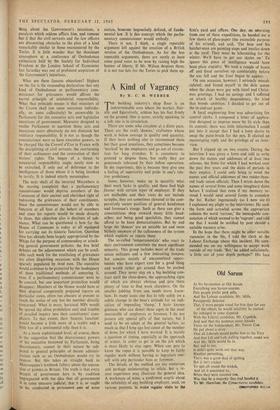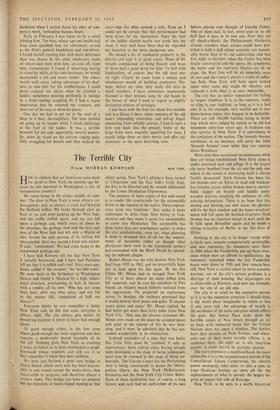A Kind of Vagrancy
By R. C. H. WEBBER THE building industry's shop floor is an indeterminable area where the worker, liter- ally and figuratively, seldom has his feet firmly on the ground. One is never, strictly speaking, in a job; one is in circulation.
There are some who circulate at a dizzy pace, These are the craft 'dunces,' craftsmen whose work is below average in quality and quantity. If they have nothing else to recommend them but their good intentions, they sometimes become 'marked' by the employers and go out of circula- tion for long stretches. It is customary to pretend to despise them, but really they are generously tolerated by their fellow operatives. In my experience, this is because they give one a feeling of superiority and pride in one's rela- tive proficiency.
Some, however, make up in quantity what their work lacks in quality, and these find high javour with certain types of employer. If they are malleable and their vices do not include scruples, they are sometimes elevated to the com- paratively secure position of general handyman and foreman's stooge. Such as these can give a conscientious shop steward many little head- aches; not being good specialists, they cannot afford to be keen demarcationists. But by and large the 'dunces' are an amiable lot and seem blithely unaware of the callousness of the system which exploits or rejects them.
The so-called 'temperamentals' who react to their environment constitute the more significant minority. This group. includes most of the trade union militants and a few interesting mm pen, but consists mainly of uncommitted oppor- tunists who have expert eyes for a good thing and would rather get around than be pushed around. They never stay on a big building con- tract until the close-down, the approaching signs of which arc always obvious and give them plenty of time to find work elsewhere. On the smaller jobbing firms one needs more know- how. In many cases one has to rely solely on a subtle change in the boss's attitude for an indi- cation of impending 'slump.' I have known geniuses who can detect these signs in the most inscrutable of employers or foremen. I do not possess any special gifts of that nature, but I used to be an adept at the general tactics; so much so that I long ago lost count of the number of firms for which I have worked. It is mainly a question of timing, especially at the approach of winter, in order to get in on the job which is most likely to stay open. When one gets to know the ropes it is possible to keep in fairly regular work without having to ingratiate one- self with any particular boss or foreman.
The details of the method are too numerous and perhaps uninteresting to relate; but a re- cent experience may illustrate the general idea. A workmate of mine, a confirmed sceptic about the reliability of any building employer, used, on various pretexts, to make regular visits to the firm's yard and offices. One day, on returning from one of these expeditions, he handed me a few sheets of glass-paper (the ostensible purpose of his errand), and said, 'The boss and his hatchet-man are painting steps and trestles down at the yard. They must be hibernating for the winter. We'll have to get our skates on.' To ignore this piece of intelligence would have been plain stupidity. We took a couple of hours off and fixed ourselves up comfortably before the axe fell and the frost began to appear.
On one occasion, however, I seriously miscal- culated; and found myself in the dole queue when the shops were gay with tinsel and Christ- mas greetings. I had no savings and I suffered an attack of healthy despondency, the kind that breeds ambition: I decided to get out of the in-and-out game.
A local engineering firm was advertising for control clerks. I composed a letter of applica- tion designed to impress more by its style than its content; there was little information I could put into it except that I had a keen desire to swap the paint-brush for the pen. It elicited an encouraging reply and the privilege of an inter- view.
But I slipped up on two counts. During the interview I was given a form and told to write down the names and addresses of at least two referees, the firms for which I had worked over the past five years and the dates of periods in their employ. I could only bring to mind the names and official addresses of two redder-than- red trade union officials. Then I wrote down the names of several firms and some imaginary dates before I realised that even if my memory re- vived I would need several forms to complete the list. Rather ingenuously (as I now see it) I explained my plight to the interviewer. He took the form and scrawled across the appropriate column the word 'various,' the inescapable con- notation of which seemed to be 'vagrant'; and told me that I would be notified by post should a suitable vacancy arise.
In the hope that there might be other suitable vacancies in the file, I told the clerk at the Labour Exchange about this incident. He com- mended me on my willingness to accept work outside of my trade. 'But,' he added solicitously, 'a little out of your depth perhaps?' His face
hardened when I turned down his offer of tem- porary work, 'unloading banana boats.'
Early in February I was taken on by a small jobbing firm. The boss, whose age and health had long since qualified him for retirement, served as the firm's general handyman and van-driver. I found myself treating him with more deference than was shown by his other employees, some of whom had been with him, on and off, from time immemorial. I found it unnerving having to stand by while, at his own insistence, he would manhandle a tall and heavy ladder. The others would walk away, taking advantage of his deaf- ness .to cuss him for his stubbornness. I could never conceal my alarm when he climbed a ladder, sometimes pausing perilously to indulge in a body-rending coughing fit. I had a vague impression that he resented my concern, and went out of his way to show his paces..
One day we had to get on to the roof of a shop in a busy thoroughfare. The boss insisted on going up to inspect while I stood anchorage at the foot of the ladder. It was a terrible moment for me and, apparently, several passers- by, when he stood on the narrow coping pain- fully struggling for breath and then walked the razor-edge for what seemed a mile. Even so, I could not be certain that this performance had been given for my instruction. Since the foot of the ladder slanted nearly two yards into the road, it may well have been that he regarded my function as the more dangerous one.
He owned a lot of residential property in the district and kept it in good repair. None of his tenants complained of being fleeced and most of them had a good word for him. To hell with landlordism, of course; but the old man was all right. Clearly he came from a unique and obsolescent mould of building employers. Per- haps, before my time, they really did exist in small numbers. I have sometimes impassively listened to their praises, sung by old hands in the throes of what I used to regard as slightly deranging seizures of nostalgia.
I had been with the firm for about five months and was liking it there, when rumours of the old man's impending retirement and sell-up began emanating from reliable sources. I had to take a firm step back into the present. Some of the large firms were urgently appealing for men. I would judge them on their merits and offer my assistance to the most deserving case.


































 Previous page
Previous page